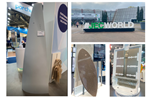Toray subsidiary establishes glass fiber recycling process in Europe
Calculations from SKZ confirm that polyphenylene sulfide (PPS) made with this proprietary recycling process reduces the carbon footprint by 45%.

Photo Credit: Getty Images
On June 1, Toray Industries Inc. (Tokyo, Japan), announced that its marketing
and sales subsidiary, Toray Resins Europe GmbH (TREU, Neu-Isenburg, Germany) has established a recycling process for glass fiber-reinforced polyphenylene sulfide (PPS) resin waste from injection molding processes. TREU created its process by leveraging proprietary compounding technology in collaboration with tolling partner MKV GmbH Kunststoffgranuate (Beselich, Germany), a compounding company that specializes in recycling engineering and high-performance plastics. Such resin is said to have 50% recycled content and retains at least 90% of the mechanical strength that injection grades from original materials deliver.
Plastics testing and research center SKZ – Das Kunststoff-Zentrum (Würzburg, Germany), also known as the German Plastics Center, has calculated and verified that PPS made with this recycling process can deliver a carbon footprint that is around 45% lower than that of original PPS. The calculation was conducted based on the international lifecycle assessment (LCA) standards ISO 14040, ISO 14044 and the standard ISO 14067 “Carbon footprint of products.”
TREU, which supplies PPS resins to customers throughout Europe, is beginning to promote this recycled PPS solution as Ecouse Torelina. Ecouse is Toray’s integrated, worldwide brand for recycled materials and products.
Glass fiber-reinforced PPS offers high flame resistance, long-term durability and chemical resistance. As a result, it enables diverse applications, including electric vehicles and other automobiles, electrical and electronic equipment and water-related parts. According to Toray, conventional glass fiber-reinforced PPS recycling has had repeated molding shortens and breaks the glass fibers, greatly degrading mechanical strength and this issue has constrained recycling rates.
To learn more about Toray’s other sustainability initiatives, read “Toray to develop sugar from biomass waste for production of resins, fibers.”
Related Content
-
TU Munich develops cuboidal conformable tanks using carbon fiber composites for increased hydrogen storage
Flat tank enabling standard platform for BEV and FCEV uses thermoplastic and thermoset composites, overwrapped skeleton design in pursuit of 25% more H2 storage.
-
Recycling end-of-life composite parts: New methods, markets
From infrastructure solutions to consumer products, Polish recycler Anmet and Netherlands-based researchers are developing new methods for repurposing wind turbine blades and other composite parts.
-
Cryo-compressed hydrogen, the best solution for storage and refueling stations?
Cryomotive’s CRYOGAS solution claims the highest storage density, lowest refueling cost and widest operating range without H2 losses while using one-fifth the carbon fiber required in compressed gas tanks.
















